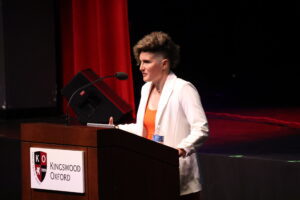April 30, 2024
Stroud Science Speaker Outlines Vaccine Development & Protocols at Assembly
Stroud Science Symposium speaker Rebecca Rose Matoska ’07, a medical researcher with a background in biopharmaceutical companies and vaccine development at the National Institute of Health (NIH), spoke at a recent assembly. Matoska credits her Upper School AP Biology teacher, Carol Caley, for setting her on the research path. Recognizing Matoska’s interest in the field, Caley connected Motoska with a professor at UConn Health, where she spent the summer interning for him and was “set loose” in a lab.
Matoska explained proteomics, the evaluation of proteins in a sample. It’s a holistic approach to examining an organism’s function or disease. Proteins come in various shapes and sizes, which determines their specific functions. When scientists study them, they can learn a lot about the cell and its health. They use proteins to understand better what’s occurring in a sample.
One critical resource used in her work is the mass spectrometer, an analytical technique used to measure the mass-to-charge ratio of ions. This device, the size of a boom box, breaks molecules down even further from their original structure. “The mass spec has been called the smallest scale in the world,” she said, “but that’s a bit of a misnomer because we’re not measuring the weight of something. We’re looking at what’s present in it.” Each molecule has a unique chemical signature when run through the mass spectrometer. Measured against various databases created by the sampling of millions of substances over many years, scientists can decipher the contents of a given sample. Sometimes, they even have the opportunity to add to the collective database for future research applications.
While she worked for a biopharmaceutical company that develops antibody-based therapeutic treatments for cancer, the researchers examined the disease by using the mass spectrometer to analyze proteins, the functional units of the cell. From the various protein identifications, the researchers could decide what to do with the information—what drug products are we interested in studying? Are we having the effect you’d like to see?
A vaccine must be analyzed through many steps and clinical studies before it can be used on humans. Although the drug might be promising in lab mice, the “recipe” must be tweaked before human application to ensure the vaccine’s stability and proper concentration. After the vaccine is prepared, it sits on a shelf, is tested monthly, and put through the mass spectrometer.
“The best way to answer if a drug product is essentially surviving and doing what we expect over time is to use the mass spectrometry on it,” she said. Through the mass spec, the researchers separate the drug product, and the device can determine what is still present.
Matsoka noted that research is only one facet of vaccine development. After the product is developed and tested, other departments in the company work on outreach, education, and marketing. Collaboration is critical, she said.
“The more you’re willing to have a conversation with colleagues, to work with people in similar backgrounds and different backgrounds, that’s where the best ideas come from, usually,” she said. “It’s when you share thoughts with others and come up with new ideas because they saw something in their field that overlaps with what you’re seeing. Sharing information, furthering information, whether it’s a paper, going to a lecture and sharing your ideas, or going to a conference and getting new information, is really key. Just constantly having that system of checks and balances to study the field further and come up with new ideas is important.”
Matsoka gave the students essential tips for working in a lab, including planning their experiments well, organizing their samples, saving them, and repeating the experiment many times.
“Science is full of mistakes, full of things that didn’t work,” she said. “The more you do your work ahead of time to read everyone else’s mistakes, the less likely you are to repeat them, and the more successful your experiments are likely to be.”
Matsoka added that scientists must be persistent and use their inevitable discouragement to their advantage when experiments go awry. “You need to say, ‘Well, now I want to ask more questions’—that’s the best way to continue to have success in science or to seek out further knowledge of science.”
News Main News
